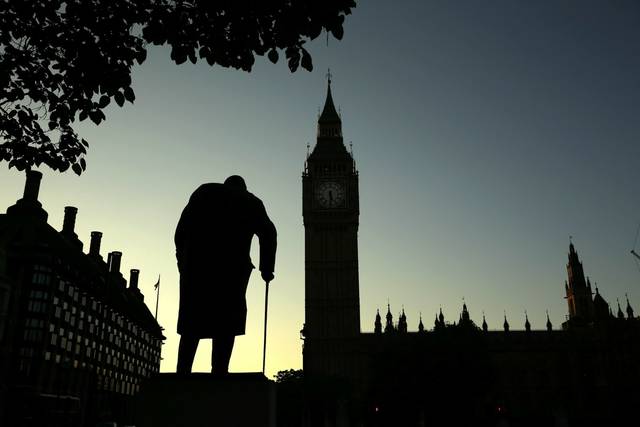https://naviga.triblive.com/opinion/paul-kengor-winston-churchill-vs-the-cancel-culture/
Paul Kengor: Winston Churchill vs. the cancel culture

It was 89 years ago, on March 7, 1932, that Winston Churchill spoke in Pittsburgh. He spoke at Oakland’s Carnegie Music Hall. This wasn’t the Churchill of the “Iron Curtain” speech (delivered March 1946), or even the Churchill who became prime minister eight years later. This wasn’t yet the Churchill of history, but still he drew over 1,000, as he held forth on the subject for which he’s renowned: securing peace.
As for that Churchill, that magnificent feat seems to have been set aside; the man is being skewered. The Churchill who defeated the Nazis and warned of the Soviets is being dispatched to the ash-heap of history by today’s cultural revolutionaries. Churchill is being summed up as nothing short of a “white supremacist” — “the perfect embodiment of white supremacy.”
That was an assertion leveled at a panel of Cambridge professors at (ironically) Churchill College, which insisted that Winston’s “British Empire was far worse than the Nazis.” No surprise, the statue movement sweeping America is taking a broom (or at least a spray can) to Churchill. In London’s Parliament Square, BLM protesters spray-painted in red the word “RACIST” on Churchill’s statue.
Of course, Churchill’s memory deserves a little more.
One person not given to simplistic assessments of Churchill is Gary Scott Smith, former professor at Grove City College.
“Churchill was powerfully influenced by the imperialist, racist, sexist ethos of his age,” concedes Smith in a Newsweek piece. “Nevertheless, throughout his life, Churchill took many unpopular stands, including high taxes on the affluent and pensions for the elderly. And he pointed out the Nazi threat in the 1930s when most British leaders ignored it. His greatest contribution was comforting, inspiring and empowering the British people to resist the Nazis … when Britain stood virtually alone.” Smith quotes theologian Reinhold Niebuhr, who praised Churchill’s courageous leadership during “the world’s darkest hour.”
Churchill spared the world a terrible darkness that seemed inevitable.
Smith has just published “Duty and Destiny: The Life and Faith of Winston Churchill,” a must-read on this man who many on both sides of the Atlantic regarded as literally the Man of the 20th Century. In a 2002 BBC poll, Brits named Churchill their greatest countryman ever.
“We should acknowledge the shortcomings and misguided policies of all leaders,” Smith says, “but remembering their social and political contexts, we should provide a balanced assessment of their actions.”
Who could argue with that? Every hero has flaws: Washington, Jefferson, Lincoln. And yes, liberals, even your heroes. Look at what your icon FDR did to Japanese Americans in World War II. Look at Margaret Sanger’s hideous statements on racial eugenics. Look at Woodrow Wilson’s record on race. Look at Karl Marx, a racist and anti-Semite. And for someone universally hailed and rarely dare criticized, look at the sexual accusations against Martin Luther King Jr. by (among others) his biographer David Garrow. Do you want to cancel King over that?
I don’t want to cancel anyone.
As for Winston Churchill, he confronted Nazis and Bolsheviks, but against the cancel culture, the man isn’t alive to defend himself. The task falls to those of us whose civilization he fought to protect.
Criticize Churchill where it’s due, but don’t disregard his great achievements.
Copyright ©2026— Trib Total Media, LLC (TribLIVE.com)
